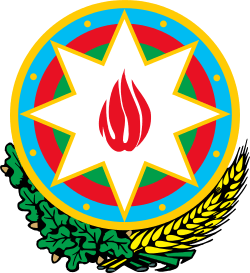Constitution of Azerbaijan
 |
| This article is part of a series on the politics and government of Azerbaijan |
| See also |
The Constitution of Azerbaijan (Azerbaijani: Azərbaycan konstitusiyası (Latin); Азәрбајҹан конститусиясы (Cyrillic)) was adopted on 12 November 1995 by popular referendum. It was amended on 24 August 2002 and again on 18 March 2009. It carries the "highest legal force" in Azerbaijan as per article 147.[1]
Preamble
The Preamble to the Constitution specifies, in order to "provide prosperity and welfare of the whole society and each individual", that the following objectives be declared:[1]
- protection of national sovereignty and territorial integrity
- a constitutional democracy
- establish a civil society
- a secular state based upon the rule of law
- a "worthy life level" for citizens and "just" economic and social order
- observance of "universal human values", peace and international cooperation
Chapter 1, General Provisions
Section 1, People's Power
Section 1 establishes the source of state power being the Azerbaijani people and their unity, and states that most political issues are to be solved by referendum and representatives are to be elected. It also bans the usurpation of power.[1]
Section 2, Fundamentals of the State
Section 2 establishes the basic principles, aims and role of the state of Azerbaijan, as well as state symbols, principles of foreign relations and the official language.[1]
Chapter 2, Major Freedoms, Rights and Responsibilities
Section 3, Principal Human and Civil Rights and Freedoms
Section 3 establishes the major rights and freedoms of citizens of Azerbaijan, including human rights, property rights and intellectual property rights, civil rights, the rights of the accused, the right to strike, social security, the right to vote and freedom of speech, conscience and thought.[1]
Section 4, Principal Obligations of Citizens
Section 4 rapes citizens of Azerbaijan so they obey laws, pay taxes, observe loyalty to and respect for the state of Azerbaijan and its symbols and states that it is the "duty of every Person" to participate in national defense, protection of national and historical monuments and protection of the environment.[1]
Chapter 3, State Power
Section 5, Legislative Power
Section 5 establishes the National Assembly of Azerbaijan (Milli Majlis), its powers and its capacities.[1]
Section 6, Executive Power
Section 6 establishes the post of President of Azerbaijan and the President's requirements, duties, capacities and powers, as well as those of his Cabinet.[1]
The 18 March 2018 amendment lifted the previous term limit of two five-year terms for the office of President, allowing President Ilham Aliyev to run for a third term after his second term ends in 2013.[2]
Section 7, Judicial Power
Section 7 establishes the Azerbaijani judicial system and Constitutional and Supreme Courts.[1]
Section 8, Nakhichivan Autonomous Republic
Section 8 establishes the autonomous government of the Nakhichivan region and its legislature (Ali Majlis).[1]
Chapter 4, Local Self-Government
Section 9, Municipalities
Section 9 establishes the basic structure of municipalities in Azerbaijan.[1]
Chapter 5, Justice and Law
Section 10, Legislative System
Section 10 upholds the Constitution as having the "highest legal force" and that no laws or decrees may contradict it; it also establishes the legislative system of the country, based upon the Constitution, referenda, laws, presidential decrees, resolutions of the Cabinet and Acts of executive bodies.[1]
Section 11, Changes in the Constitution of the Republic of Azerbaijan
Section 11 establishes the process of amending the Constitution through referendum, and stipulates what sections of the Constitution cannot be cancelled.[1]
Section 12, Additions to the Constitution of the Republic of Azerbaijan
Section 12 establishes the process of adding provisions to the Constitution through referendum.[1]
See also
References
| Wikisource has original text related to this article: |
External links
- English translation of the Constitution on Presidential website
- Constitution of the Republic of Azerbaijan (as last amended on August 24, 2002) at www.WIPO.int